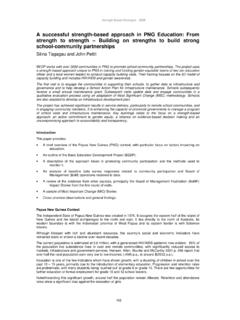Transcription of Draft version Motivational Interviewing for Social Work ...
1 Strength Based Strategies - 2006 38 Draft version Motivational Interviewing for Social Work: Motivation, Change Talk & Positive Outcomes Michael D. Clark, MSW1 Motivational Interviewing (Miller & Rollnick, 1991) is a way of talking with people about change that was first developed for the field of addictions but has broadened and become a favored approach for use with a wide variety of populations in many different settings (Burke, Arkowitz & Dunn, 2002). It is in kinship with the Strength-based approach which has been transitioned to child protective services (Turnell & Edwards, 1999), Child Welfare (Berg & Kelly, 2000) and case management efforts with youth and families (Clark, 2001). This article will suggest several benefits for the importation of Motivational Interviewing into Social Work practice.
2 This article posits seven reasons to consider the Motivational Interviewing approach: Why would Social Work staff want to use Motivational Interviewing in their day-to-day work? 1. It can help Social Work staff get back into the business of behavior change. 2. It suggests effective tools for handling resistance and can keep difficult situations from getting worse. 3. It keeps the staff from doing all the work, and makes interactions more change-focused. Interactions are more change-focused when the staff understands where change comes from. Change-focused interactions place the responsibility for behavior change on the client. Motivational interactions create an appetite for change in parents by amplifying their ambivalence. 4. Motivational Interviewing will change who does the talking.
3 5. This approach will help prepare clients for change. Ask questions that raise interest. 6. Motivational Interviewing changes what is talked about. Eliciting change talk (self- Motivational speech). 7. Agency staff can enforce court orders and deliver sanctions without leaving a Motivational style. Lying and deception Addressing violations and sanctions 1. It Can Help Staff Get Back Into The Game Of Behavior Change Historically, motivation has been viewed as a more-or-less fixed characteristic of clients. That is, a parent usually presented to a NGO agency with a certain Motivational profile and until they were ready to make changes, there was not much you could do to influence his chances. Under this model, the Social work staff becomes an enforcer of the court s orders or the agency rules and regulations, but not necessarily an active participant in the behavior change of the client.
4 One staff described his role: The parents (defendant), in consultation with their lawyer, negotiates for the consideration of case management services (and conditions) in lieu of more extreme measures (child removal or continuation of foster care, etc). In our initial meeting, and throughout our work together, I tell the parents what is expected of them and make it clear what the penalties will be should they fail to comply. We have regular meetings to verify that they are making progress on his conditions and I answer any questions they might have. If the parents do not comply with court orders or show poor progress on their conditions, I see to it that the court is notified and appropriate sanctions are assessed.
5 Throughout the process, the mandated client is well aware of the behavior that might end up with child removal (or a continuation of out-of-home placement), and if more extreme measures end up occurring, it was their own behavior that got them to that point. Strength Based Strategies - 2006 39 Reflected in this statement is a staff person who is essentially cut out of the change process, except as an observer. However, recent evidence suggests there may be quite a lot that a staff can do to influence a family s chances of successfully completing Social Work programming. Motivational Interviewing places staff back in the business of behavior change. 2. It Suggests Effective Tools For Handling Resistance And Can Keep Difficult Situations From Getting Worse Since motivation has been viewed more like a fixed client trait, it has been thought that if clients enter Social Work departments displaying little motivation, then the best strategy is to attempt to break through the parent s denial, rationalization, and excuses.
6 You got a problem. You have to change. You better change or else! Space prohibits a review of the many studies (Miller & Rollnick, 2002; Hubble, Duncan & Miller, 1999) that find a confrontational counseling style limits effectiveness. One such study (Miller, Benefield and Tonnigan, 1993) is telling. This study found that a directive-confrontational counseling style produced twice the resistance, and only half as many positive client behaviors as did a supportive, client-centered approach. The researchers concluded that the more staff confronted substance-involved clients, the more the clients drank at twelve-month follow up. Problems are compounded as a confrontational style not only pushes success away, but can actually make matters worse.
7 Although many staff rightly object, We re Social Work staff, we re not therapists! our job is to protect children and enforce the orders of the court, this claim only serves to highlight the need for strategies to help staff get back in the game of behavior change. Other staff shy away from a heavy-handed approach, using instead a logical approach that employs advice or reasoning. Why don t you Do you know what this behavior is doing to you? Here s how you should go about Unfortunately, both of these approaches can end up decreasing motivation. When these methods fail to begin behavior change, staffs will ramp up their energy and begin to push only to find the client pushes back. Staff escalates the confrontation or reasoning, only to find the client has escalated as well.
8 Locking horns creates a frustrating spiral that satisfies neither. Research finds that when we push for change, the typical client response is to defend the problem behavior. You ve got a problem / No, I don t Why don t / That won t work for me You better change or else! / Take your best shot! We clearly don t want to create a situation where the client is only defending the don t change side of the equation. Part of the equation involves using known techniques to draw out more positive talk, while the other part of the equation is having a collaborative style where clients feel more comfortable talking about change. For instance, research suggests that characteristics of the staff person even in a brief interaction--can determine the motivation, and subsequent outcome, of the client.
9 It is important to remember that there is no set personality style for a Social Work client. They are all different as they enter our agencies and offices dissimilar experiences, situations, values and temperaments. Consider the colleague who offices next to you. If all you might hear from clients visiting this neighboring office would consist of arguing, resistance and conflict, then the sensible conclusion would be this discord is not due to the clients. Since all clients are different, for a majority of client to show a certain behavior (resistance) then it would have to be the result of this staff members style of approach. 3. It Keeps Staff From Doing All The Work, And Makes Interactions More Change-Focused Interactions are more change-focused when the staff understands where change comes from Staff trained in Motivational Interviewing can turn away from a confrontational style or logic-based approaches as they become knowledgeable of the process of behavior change.
10 Many in Social Work and NGO services believe that what causes change are the services provided to the client, whether that involves treatment, the threat of punishment, advice, education or watching them and monitoring their activities. These conditions and services represent only part of the picture and not necessarily the most important part. Research finds Strength Based Strategies - 2006 40 that long-term change is more likely to occur for intrinsic reasons (Deci & Ryan, 1985). Often the things that we assume would be motivating to the client simply aren't. Thus, motivation is, in part, a process of finding out what things are valued and reinforcing to the individual Social Work client. Change-focused interactions place the responsibility for behavior change on the client.










